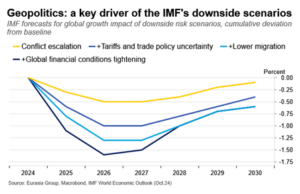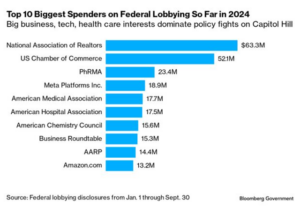Thought of the Week:
Without doubt, the most asked question I’ve received this week is, “Jamie. Who’s going to win the election?” Family, friends, business colleagues, Uber drivers, bartenders, social media acquaintances, anyone and everyone have all raised some version of “We don’t want to hear it’s really close, the election is 50/50, the race is a toss-up, every poll is within the margin of error, or the race could go either way. We know that. What does your gut tell you?” A gut feeling isn’t just some sort of wild guess or stab in the dark; it’s a real physical response. Gut feelings, sometimes called intuition, come from a combination of sources, including the brain, abdomen, and individual experiences filed away in the subconscious. Scientifically, gut feelings come from the enteric nervous system, the web of neurons in the gastrointestinal tract, where serotonin is produced and sent to the brain. These signals react to patterns from past experiences stored in long-term memory. And when the mind matches/mismatches current experiences with past experiences, a gut feeling is formed. We all know the immediate physical responses associated with gut feelings—butterflies, sweaty palms, goose bumps, muscle tightness, increased heart rates, tingles on the back of the neck, sometimes even a sense of overwhelming clarity. Psychologists tell us to evaluate past experiences, identify cognitive biases, note the time frame, and take stock of counterevidence when deciding whether to trust one’s gut, and they tell us that trusting one’s gut is most valuable when the timeline is short, you have experience in the field, and you can complement your intuition with analytical thinking. In a small group discussion earlier this week, which included members of the Washington office, NBC News Chief Political Analyst and former Meet the Press moderator Chuck Todd expressed his gut feeling in football parlance saying, “Trump is a 2.5-point favorite,” but admitted his heart remains with the underdog. Likewise, during the same discussion, Barry Jackson, former Chief of Staff to House Speaker Boehner, said although he’s worried about GOP turnout, his instincts tell him Trump wins all other things being equal. In a separate note to clients, Eurasia Group Founder and President Ian Bremmer told us that he still believes Trump ekes out a win based on his lead on the issues of immigration and the economy. The data and guts of Charlie Cook, The Hill, FiveThirtyEight, Nate Silver, and The Economist all seem to agree, putting Trump’s odds of winning somewhere between 51%-54%. So, what about my gut? Momentum has shifted toward Trump in recent weeks, and the polls are moving subtly, yet perceptibly, in favor of the former president. The voters Harris most needs to secure an Electoral College victory are the same ones who remain skeptical of her positions from the 2019-2020 campaign. There’s a noticeable feeling of desperation in the air around Democrats, and the left’s claims that Trump is a fascist, would be dictator, and/or reincarnation of Adolph Hitler feel like a “Hail Mary” pass. Following eight years of trying to label the former president one of the worst people to ever walk the earth, there’s a “Boy Who Cried Wolf” quality to the Harris campaign’s latest claims. There are even questions about whether Democrats themselves truly believe the labels they’re trying to stick on the Republican candidate—would the Democratic Senate Majority Leader really sit next to Hitler at a charity dinner, much less laugh at his jokes? My gut feeling is an extremely close election, one we may not know the outcome of on Election Day, where the popular vote goes to the Vice President but the Electoral College tilts to the former president.
Thought Leadership from our Consultants, Think Tanks, and Trade Associations
Brookings Reviews U.S. Economic Recovery from Covid-19 Compared to Other Nations. The pandemic-era recession was unlike any other in U.S. history. Beginning in February 2020, the recession reached depths not experienced in roughly a century before abating just as fast. A combination of unprecedented fiscal support, rapid deployment of vaccines, and structural economic resilience helped jumpstart the swift and enduring U.S. recovery, with the economic expansion now entering its fourth year. As the economy continues to grow, two important characteristics have emerged: (1) the U.S. avoided the deep economic scarring that impacted millions of American households during the 2008 recession; and (2) the U.S. recovery has far outpaced most of its G10 peer. In the wake of the pandemic, many of the U.S.’s competitors repeated their prior mistakes. As the global economy remained disrupted by COVID-19 in 2021 and beyond, many foreign governments opted for premature fiscal consolidation in which the policy response was too muted to help return their respective economies to prerecession form. By contrast, U.S. policymakers opted for more generous countercyclical support—including massive relief bills passed under both Democratic and Republican administrations that provided assistance past even the omicron and delta waves of COVID-19. As a result, there is now no meaningful slack in the U.S., unlike Europe where activity is falling behind its pre-pandemic trend. Perhaps most important, U.S. labor force participation has risen to record highs across major population groups, especially among prime-age women. Elevated inflation in 2021 and 2022 abated quickly and in recent years was driven more by supply constraints in the housing market than by fundamental imbalances in supply and demand. The steady fall in non-shelter year-over-year inflation, which now stands at just 1.1%, underscores that supply disruptions—not overheating—were by far the main drivers of high inflation right after the pandemic. All told, the post-COVID recovery reaffirms the difficult choices made by policymakers and ultimately vindicates U.S. policy choices.
Capstone Sees $14.9B in Inflation Reduction Act Grant Funding in Trump’s Crosshairs, with Key Targets Including Renewables, Clean Vehicles, and Emissions Reduction. Unspent Inflation Reduction Act (IRA) grant and loan funds, specifically those for clean heavy-duty vehicles, renewables, and green hydrogen, would be at risk if Donald Trump wins the election. A President Trump would likely halt, stall, or reallocate the approximately $14.9 billion in unawarded IRA grants. If Republicans were to also win control of the House and Senate, they could re-appropriate IRA funding to offset the cost of an extension of the Tax Cuts and Jobs Act, adding risk for the industries.
Eurasia Group Says All Election Challenges Lead to Congress. No matter who wins, recounts and election challenges are likely. If Harris loses, litigation is likely to focus on the recount process. If Trump loses, election challenges could be broader reaching; in fact, the Trump campaign has developed a plan to challenge state and local certification of election results in a Harris victory scenario. The effort would not be intended to forcibly change the ultimate outcome, but rather to create a pretext for members of Congress to object to states’ electoral slates on January 6, 2025. While certain members of Congress are likely to raise objections, objections are unlikely to garner the majorities necessary in both chambers to disqualify states’ electoral votes. To raise an objection, 1/5 of each chamber would need to agree to challenge a states’ electoral slate—this would be difficult but not impossible. Sustaining that objection would require ½ of each chamber, and here the Senate would almost certainly be an obstacle to overturning any result. Pennsylvania, Georgia, and Michigan will be the states most likely to face congressional challenges. Regardless of outcome, there will also be pressure on electors to switch their votes away from their pledged candidates and become “faithless electors;” this too is unlikely to shift the outcome. Following the 2016 election, high profile Democratic advocates pressured electors to change their vote away from Trump. Since then, the Supreme Court upheld states’ authority to regulate how electors vote, and most states have laws ensuring that electors vote accordingly. Recounts will drive headlines but are also unlikely to change the results of the election. Recounts rarely change election results: of the 31 recounts in statewide races between 2000 and 2019, only 3 changed the result. In the end the net effect of both dynamics will exacerbate perceptions of illegitimacy and further degrade trust in the federal system.
“Inside Baseball”
IMF Forecasts Steady, but Subpar, Growth with Geopolitics Tilting Risks to the Downside. The IMF’s World Economic Outlook expects the global economy to grow 3.2% in 2024, below the 3.3% registered in 2023. For 2025, the Fund revised its growth forecast down to 3.2% from 3.3% in July, well below the 2000-19 average of 3.8%. While global inflation is expected to continue easing, the primary concern is rising geopolitical risk. Geopolitics—notably trade policy uncertainty, tighter immigration policies (particularly under a second Trump administration), and potential escalation in global conflicts—pose major downside risks. The IMF believes markets are underpricing geopolitical risk and estimates that a combination of negative shocks could cause global growth to decline 1.5ppts below its baseline 2026 forecast.

In Other Words
“I wouldn’t mind this job…I like this job. I would come back and do it again,” former President Trump working at a Pennsylvania McDonalds.
Did You Know
The U.S. economy has grown 13.5% since 2020 and employs 17 million more workers. 2024 vs. 2020:
2024 2020
GDP (real 2023 dollars) $28.2 trillion* $24.8 trillion
Employment 159 million jobs 142 million jobs
*projected
Graph of the Week
The National Association of Realtors (NAR) spent more than any group on lobbying through the third quarter, $63.3 million, edging out the U.S. Chamber of Commerce, which spent more than $52 million. Although not required, both included election-related expenses in their figures. NAR disclosed lobbying on housing affordability, data privacy, and AI, while the group’s PAC supported vulnerable House and Senate incumbents, including Sen. Brown (D-OH), Sen. Cruz (R-TX), and Reps. Lawler (R-NY) and Davis (D-NC). The Chamber lobbied heavily on autonomous vehicles, AI, funding for Ukraine and Israel, and streamlining regulatory permits. Many top lobbying firms also said their business was up, in large part due to the fight over taxes. The top grossing firm, Brownstein Hyatt Farber Schreck, hauled in $17 million during the third quarter (SCOA is a Brownstein client).
